
Sweden - Private operators' electric and diesel locomotives
For a full scale picture, please click on the picture shown !
Please note that this page contains also pictures of regional operators' trains which are operated by
state railways SJ. The distinction between "private" and "state" is not clear in Sweden.
Gävle Järnvägsteknik Ab
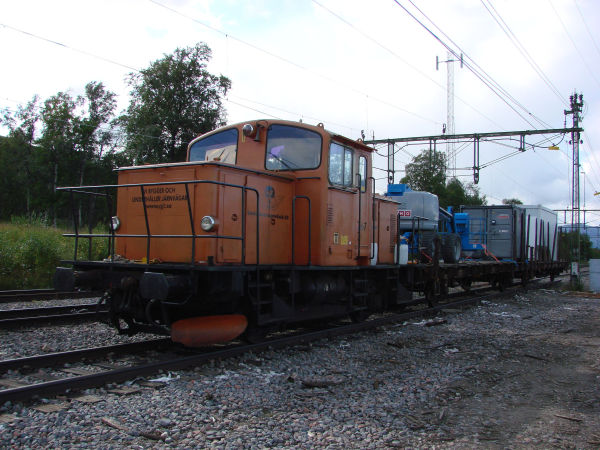
Gävle Järnvägsteknik Ab's small diesel locomotive of class Z67 by Vuoskkojohka near Abisko on the Kiruna-Narvik
Malmbanan route.
Picture 14.8.2014 by Ilkka Siissalo.
Hector Rail
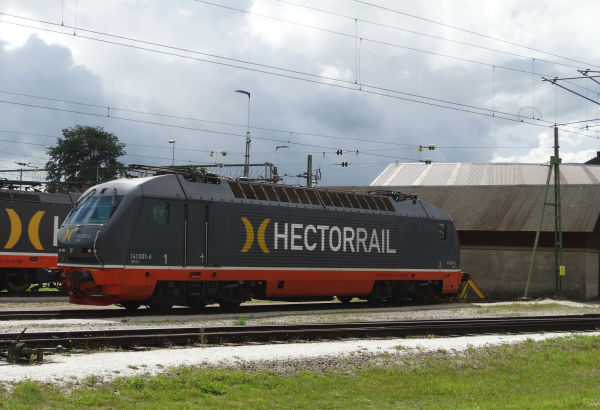
Sweden has about 30 private train operators, but only a handful
of them own larger numbers of locomotives. Our title picture shows a locomotive of the succesful operator
Hector Rail. Hector calls it class 141 but actually it is an Austrian locomotive built for the Austrian state
railways ÖBB as ÖBB class 1012. Hector Rail operates not only in Sweden, but also in Norway, Denmark and Germany.
Hector Rail is a private company with headquarters in Danderyd, Sweden. It has been active in buying second hand
locomotives and using them effectively both in
cargo traffic but also in passenger trains. In 2016 Hector Rail announced it was buying 15 used old German
heavy cargo electric locomotives of the German DB class 151.
Picture of Hector Rail class 141 "Ripley" (ex ÖBB 1012.003) in Hallsberg 12.7.2016 by Ilkka Siissalo.
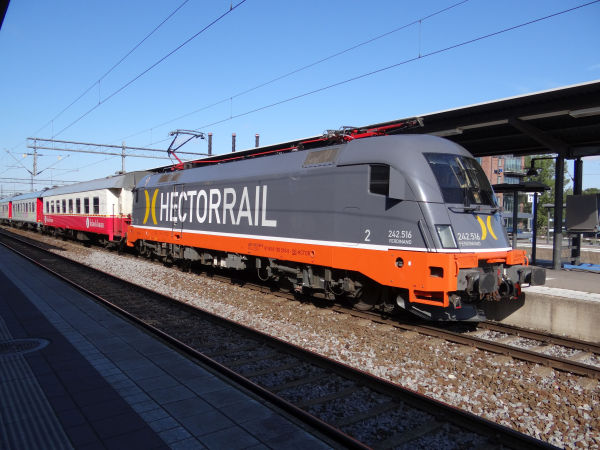
The finest and fastest of Hector Rail's locomotives. This is a Siemens Eurosprinter, known in Germany as class 182
and in Austria as Taurus, class 1116. Hector's Tauruses are still today the fastest locomotives of Sweden. They could
run 230 km/h if only the Swedish track system would be good enough for that. Here the Taurus with the name Ferdinand is
just arriving to Linköping, hauling a private express train called Snälltåget of the company Transdev. Different coaches
have different owners and the first waggon seems to be from Inlandsbanan IBAB. Hector Rail uses its Tauruses also in
through trains Sweden - Denmark - Germany, since they are capable of handling several electric systems.
Picture in Linköping 18.9.2014 by Ilkka Siissalo.
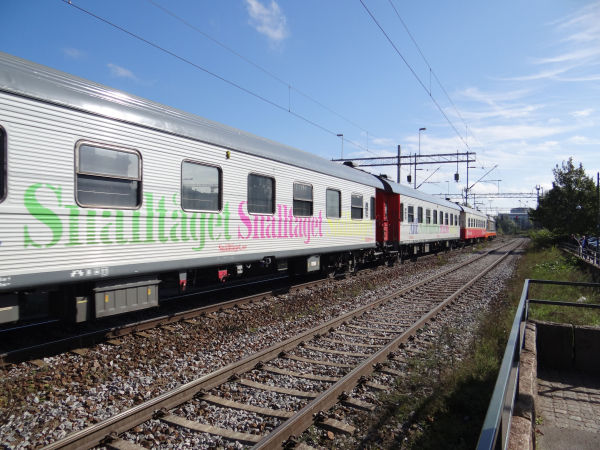
The same private train is seen here leaving Linköping, with the Hector Rail Taurus leading. Notice the light grey and
red painting of the old express train coaches: They are still in Veolia's colours and have only received large
"Snälltåget" texts to their sides. Veolia used to use these in their private Stockholm to Lapland trains, but after they
lost in a public tendering that service back to SJ, these coaches became free. Veolia is today called Transdev and the
Snälltåget service belongs to them.
In 2018 these same Snälltåget private express trains are no longer hauled by Hector Rail's locomotives. Transdev has rented
its own locomotives with the text "Loket" (Locomotive). See below on this same page at "Transdev".
Picture from Linköping 18.9.2014 by Ilkka Siissalo.
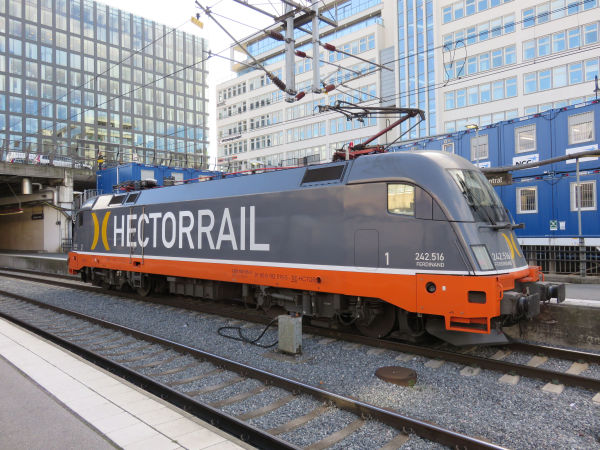
The same Hector Rail Taurus locomotive named Ferdinand, seen here at Stockholm central station, after it had just brought
in a private express train "Snälltåget" from Göteborg.
Picture from Stockholm C 25.9.2015 by Ilkka Siissalo.
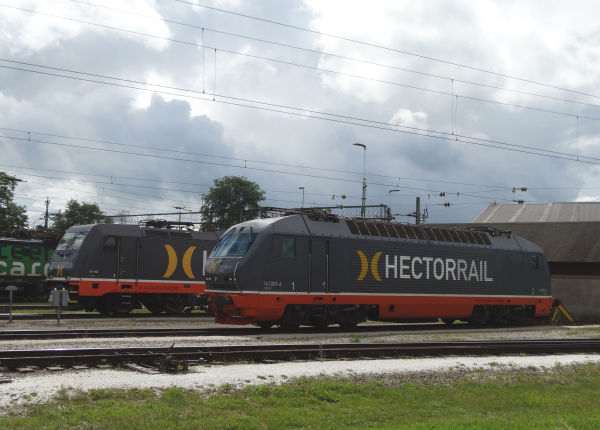
Two of Hector Rail's locomotives. The one on the left Hector calls class 241, but in practise it is a Bombardier made
second generation TRAXX similar to the German class 185.5xx. The one in front Hector calls class 141, but it used to be
an Austrian locomotive of the ÖBB class 1012.
Picture in Hallsberg 12.7.2016 by Ilkka Siissalo.
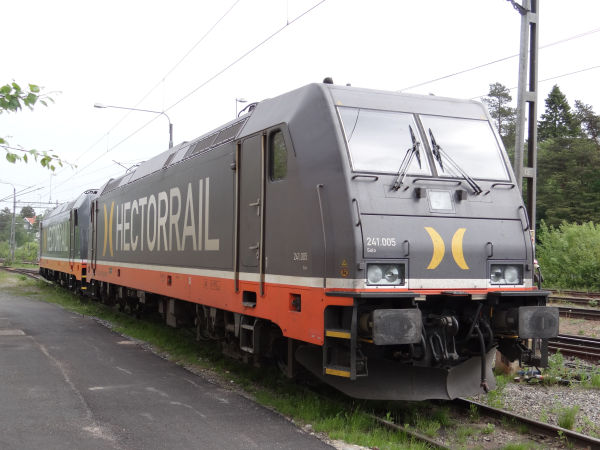
Two of Hector Rail's modern TRAXX engines of Hector's class 241, which is the second generation Bombardier TRAXX
of the German class 185.500.
Photo by Holmsund station near Umeå 9.6.2014 by Ilkka Siissalo.
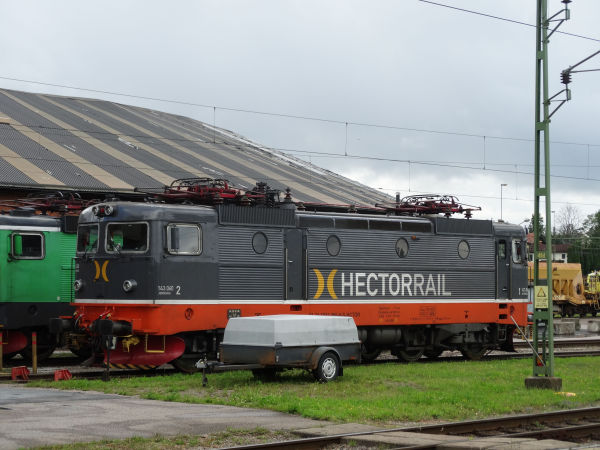
Hector Rail calls this class 143, but actually it is an old Rc3 bought from SJ.
Picture in Hallsberg 12.7.2016 by Ilkka Siissalo.
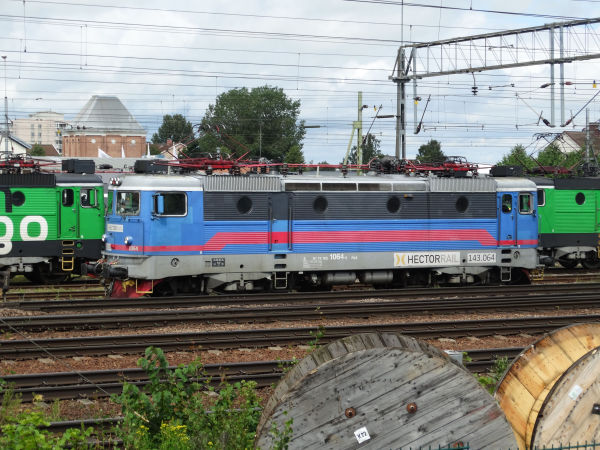
Another Hector Rail class 143, an old SJ Rc3, which has not yet been painted into Hector's own livery.
Picture in Hallsberg 12.7.2016 by Ilkka Siissalo.
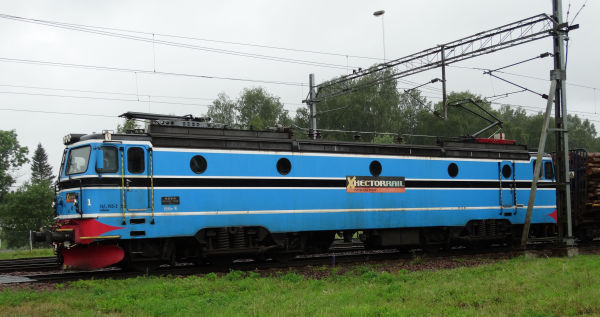
A real rarity too, this is a Hector Rail class 161 locomotive, ex. Norwegian class El 15. As is easy to see from its
looks, it is a distant relative of the Rc locomotives and also made by Asea, but these huge 6 axle locomotives
were designed to haul up to 50 wagons long rakes of iron ore wagons on the Malmbanan route in Lapland from Kiruna
to Narvik in Norway. Hector Rail now uses them for hauling huge rakes of timber. This train, apparently coming from
Kongsvinger in Norway was hauling close to 50 big timber wagons, just stopping long enough to wait for a small Regina
passenger train to free up the track.
Picture in Charlottenberg 30.6.2016 by Ilkka Siissalo.
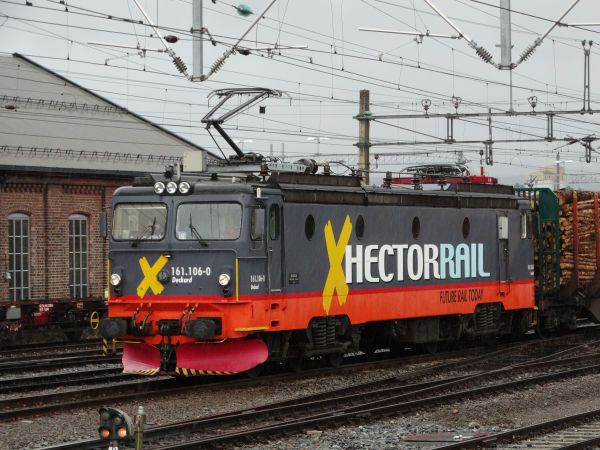
Another Hector Rail class 161, former NSB class El 15, this time on the Norwegian side of the border in Kongsvinger
waiting with a huge timber train in the pouring rain for two passenger trains to pass.
Photo at Kongsvinger station 30.6.2016 by Ilkka Siissalo.
Inlandsbanan IBAB
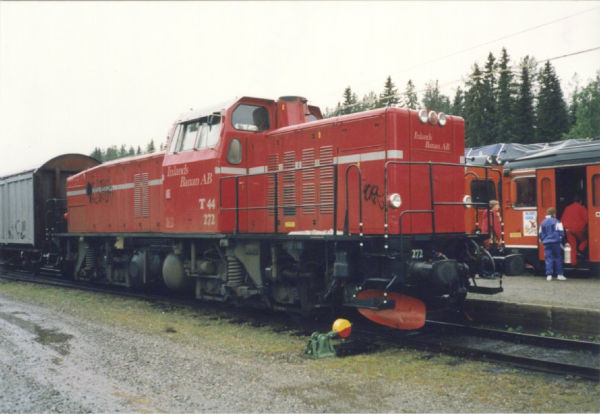
Inlandsbanan AB (IBAB) class T44 at Hoting.
Photo by Marco van Uden. Uploaded Nov 29, 1995.
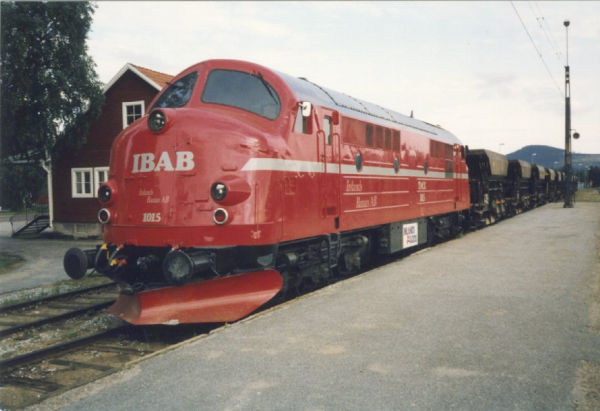
Inlandsbanan AB (IBAB) class TMX Nohab at Sveg.
Photo by Marco van Uden.
Uploaded Nov 29, 1995.
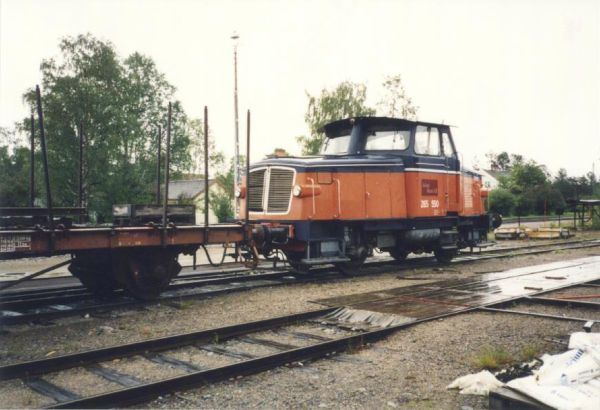
Inlandsbanan AB (IBAB) shunter class Z65 at Arvidsjaur.
Photo by Marco van Uden.
Uploaded Nov 29, 1995.
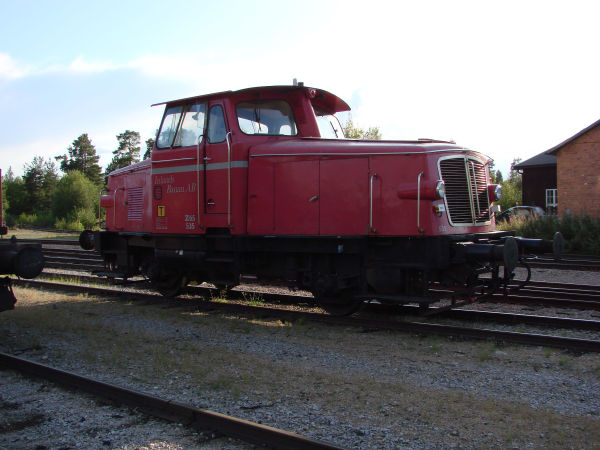
An Inlandsbanan AB shunter of the class Z65.
Picture 22.8.2009 from Sveg by Ilkka Siissalo.
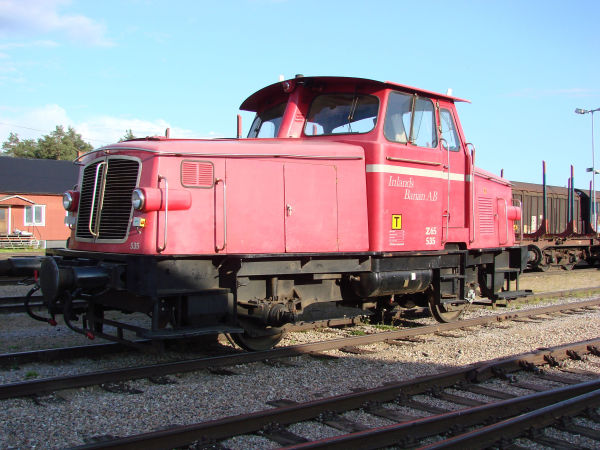
Another view of the same IBAB Z65 shunter.
Picture 22.8.2009 from Sveg by Ilkka Siissalo.
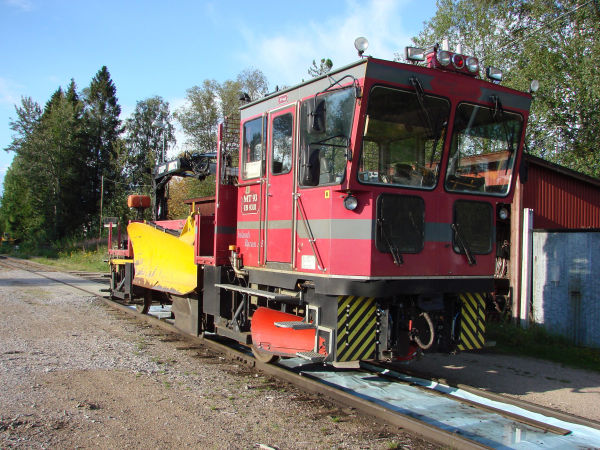
Inlandsbanan AB MT93 is a rail truck which can perform many kinds of maintenance duties and also doubles
as a snow plough. It is a model Svabo MT93 with a top speed of 70 km/h.
Picture 22.8.2009 in Sveg by Ilkka Siissalo.
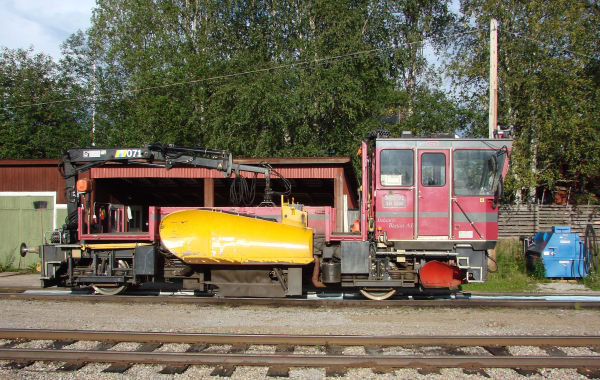
Same MT93 rail truck as above. It can transport and lift objects, grind rails and act as a snow plough.
Picture 22.8.2009 in Sveg by Ilkka Siissalo.
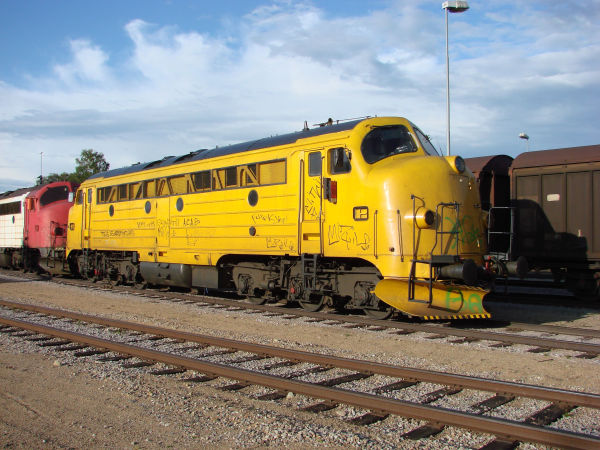
A 1950s huge Nohab diesel of the Swedish class TMY working for IBAB. There were no markings visible except for ugly graffiti,
but judging by the yellow paint, this one has most likely been previously used by Railcare. Compare with the Railcare
class TMX Nohab shown below on this same page. The cooler grids at the sides tell us that this is the older TMY
and not the TMX type of Nohab engines. Large snow ploughs also suggest that this may originally have been a Norwegian
Nohab. They called the same machine Di3 which in Denmark was MY and in Sweden TMY. But as you can notice, behind there is
yet another Nohab, with clearly Danish paintings and yet having the Norwegian style huge ploughs. Without any serial
numbers or similar, it is hard to say anything more than that this clearly is one of the earliest Nohab diesels from
roughly 1955 or so.
Picture 22.8.2009 in Sveg by Ilkka Siissalo.
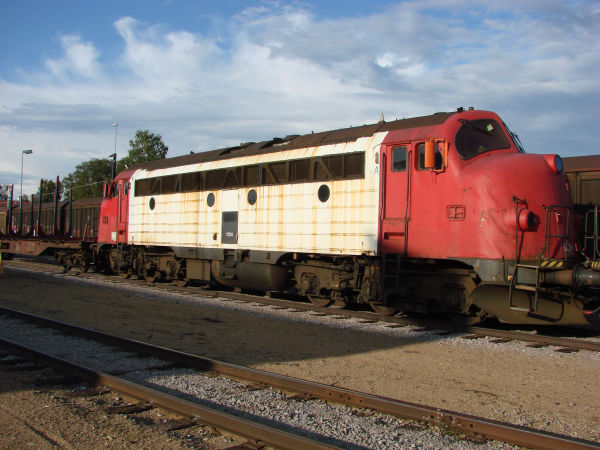
This old Nohab was built in 1957 as class MY for the Danish state railways DSB, whose old colours it here still carries.
It has had many owners. In 2004 Skånetåg AB bought it from TRX and kept it only for a year, sold it then to
Motala Verkstad AB. Here we see it owned by Motala Verkstad, but running for Inlandsbanan AB. In 2008
it was sold to Stena Recycling AB to haul recycled metal trains. In 2010 it was sold back to Denmark to
Railcare, which then 2015 rented it to the French company Captrain.
Picture 22.8.2009 in Sveg by Ilkka Siissalo.
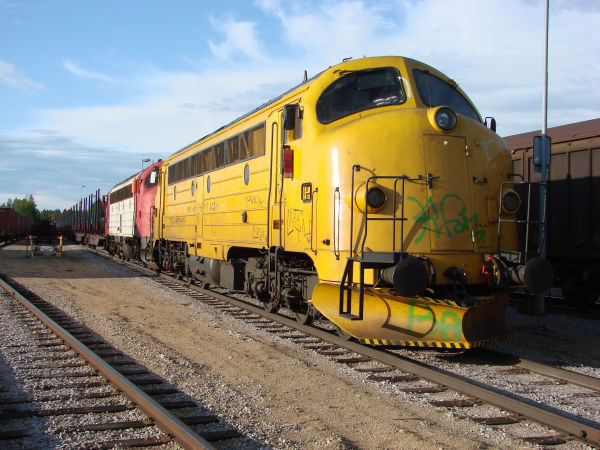
A further view of the same two old Nohabs and their empty timber train. Despite their age and the ugly graffities,
they still look like pretty mighty machines.
Picture 22.8.2009 in Sveg by Ilkka Siissalo.
Please note that there are also Inlandsbanan IBAB's railbuses shown
in the "Private operators' multiple units" category.
Luossavaara-Kiirunavaara Aktiebolaget LKAB, Malmtransport AB MTAB
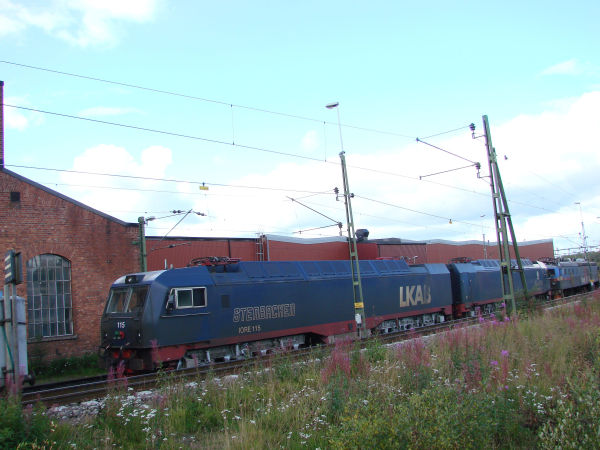
Luossavaara-Kiirunavaara AB LKAB and its daughter company Malmtransport AB MTAB run since many, many decades several
huge iron ore mines in northern Sweden. The ore is transported over the open tundra and high mountains over the
world famous Malmbanan railway leading to the Norwegian port city of Narvik. Most of the ore transport is today
performed by LKAB/MTAB's own Bombardier built double locomotives of the type IORE, which is one of world's strongest
electric locomotives.
This picture shows the IORE double locomotive 115 named Stenbacken parked by the MTAB depot in Kiruna. Picture by
Ilkka Siissalo 14.8.2009.
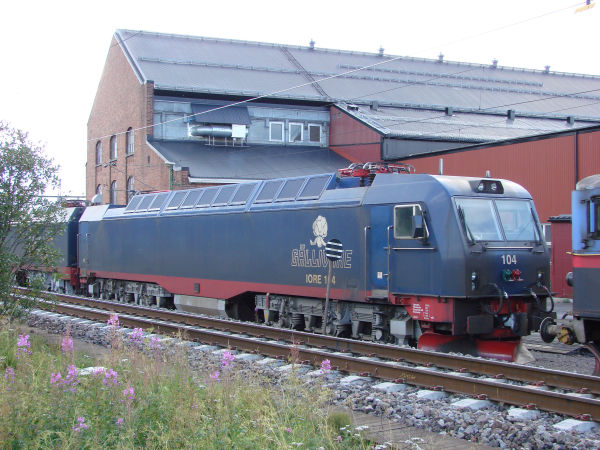
Another view of half an IORE double locomotive, this time IORE 104 "Gällivare". All the IORE units have their own names.
Picture in Kiruna by Ilkka Siissalo 14.8.2009.
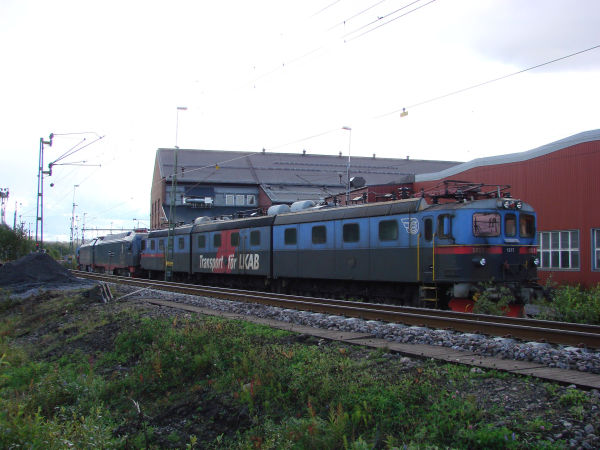
This was the previous generation of locomotives used by LKAB, the class Dm3 triple locomotive. The Dm3s are now out
of regular use and have been replaced by modern IORE units. There were once 15 of these triple monsters, each weighing
273 tons and capable of hauling a 45-48 iron ore wagon train over the high mountains to Norway. Their maximum speed
was 75 km/h, but the normal operational speed was close to 45 km/h. Power rating was 7200 kW total. They were built
1960-1970. Originally there were also two unit long double locomotive versions called Dm2, but all of them
finally received an additional middle section to become Dm3s.
Picture in Kiruna by Ilkka Siissalo 14.8.2009.
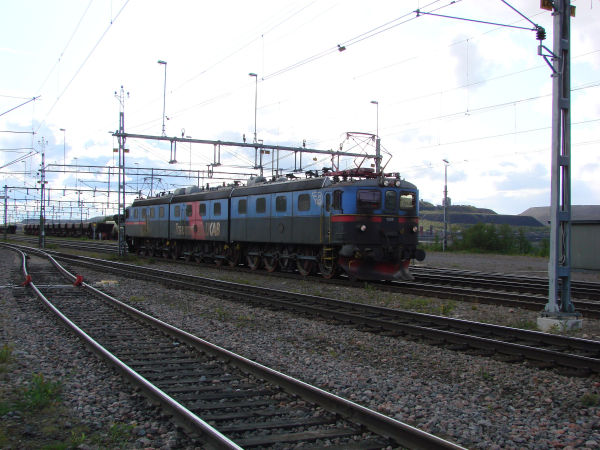
Another view of one of the old Dm3 triple locomotives. This one is the numbers 1219, 1220 and 1239 called Dennewitz,
which is one of those that used to be a two unit long Dm2, but which later on received a third section in the middle.
Picture in Kiruna by Ilkka Siissalo 14.8.2009.
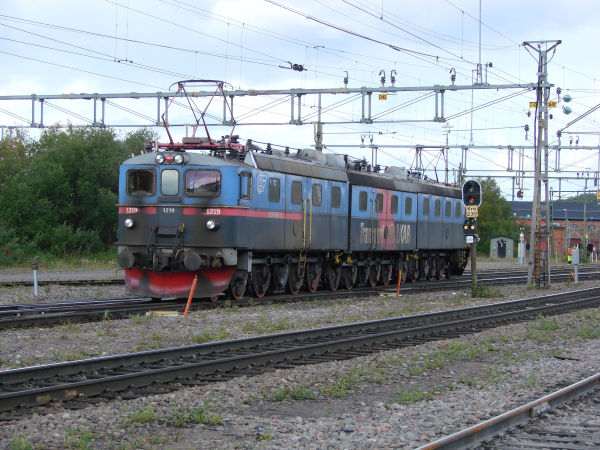
Dm3 "Dennewitz" is leaving LKAB depot for a demonstration drive with some German train enthusiasts as paying visitors
onboard.
Picture in Kiruna by Ilkka Siissalo 14.8.2009.
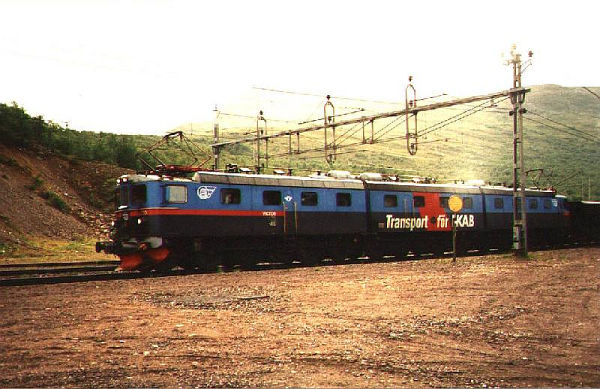
In the year 1999 Dm3 locomotives still took care of all or almost all of the iron ore traffic.
Picture of an Dm3 with an empty iron ore train returning from Norway at the Torneträsk station 5.6.1999 by Ilkka Siissalo.
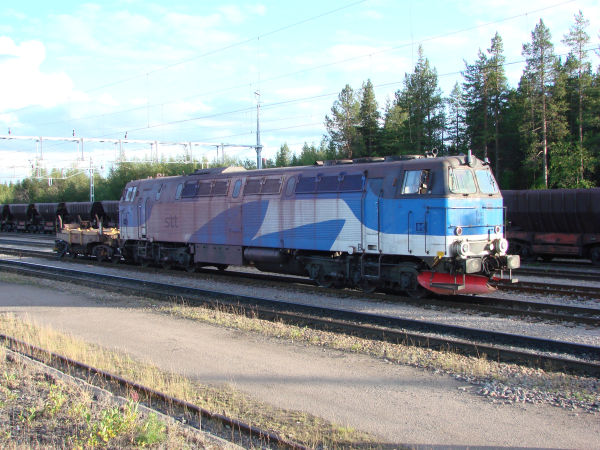
This is an originally Danish class MZ diesel built by Nohab in Sweden, which had been sold to private owners in Sweden.
Here it is performing iron ore wagon shunting in Svappavaara and it is marked as class TMZ no 1413 with still paintings of
STT, Svensk Tågteknik. STT went bankrupt in 2008 and since then MTAB has been using this machine on its own behalf.
Picture in Svappavaara by Ilkka Siissalo 14.8.2009.
Net Rail
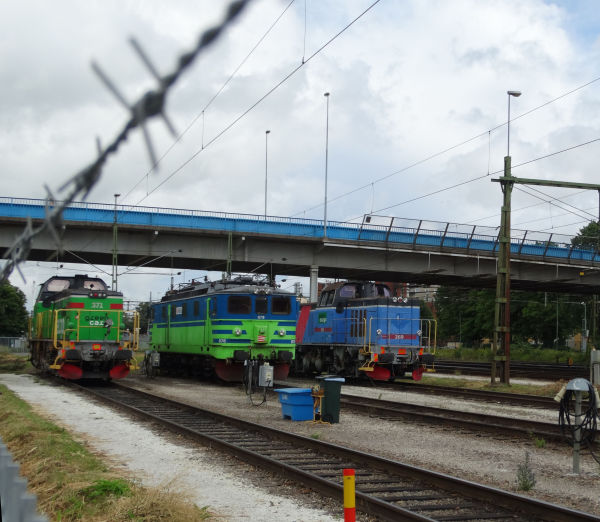
Net Rail is a company which owns and leases locomotives to other companies and also takes care of their maintenance
as well as the maintenance of wagons. In 2016 they had 9 locomotives in total.
This one in the middle is a real rarity. It is one of the really old 6 axle electrics of the class Ma,
which SJ has gotten rid of a long time ago. Here it is seen in the blue and green paintings of TGOJ, its
previous owner, but now owned by NetRail. The class Ma was built 1953-1960 by Asea and it was a heavy
cargo locomotive with a top speed of 105 km/h and 3960 kW power. The two other locomotives on both sides of the Ma
are Green cargo's diesels. The blue one is class T44 and the green one is class Td, which is a modernised and rebuilt
T44. Note the barbed wire - sometimes it is tough to get good train photos of rare locomotives over almost 3 m
high fences :-) Compare this one with the similar Ma shown on
this same page further down under the title TGOJ. But this machine
has rectangular side windows, indicating that this was one of those ones which TGOJ took over from SJ in 1990.
Picture in Hallsberg 12.7.2016 by Ilkka Siissalo.
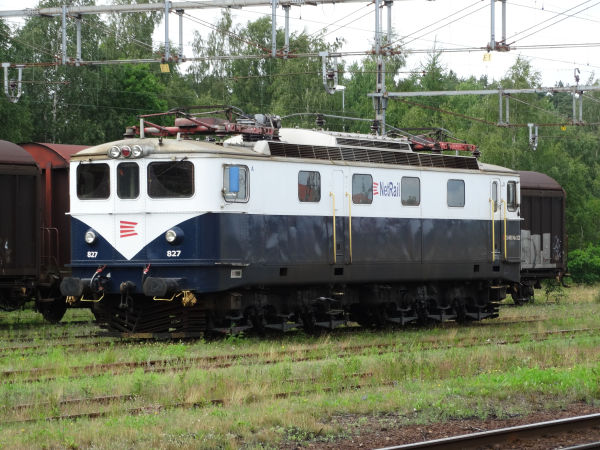
Another one of NetRail's class Ma engines, this time of the variant Ma2, which has only 104 tons of weight
and a top speed of 100 km/h.
Picture from Värnamo station 11.7.2016 by Ilkka Siissalo.
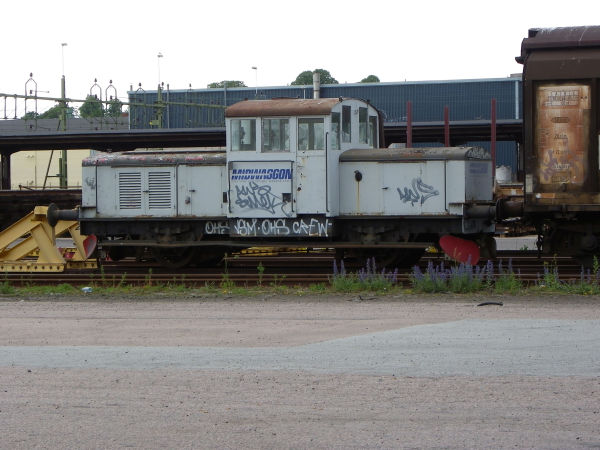
A class Z43 locomotor from 1951, previously owned by Midwaggon, which Midwaggon donated as a free of charge gift to
Net Rail - it was so old.
Picture in Helsingborg 30.6.2010 by Ilkka Siissalo.
Nordic Refinance AB NRFAB
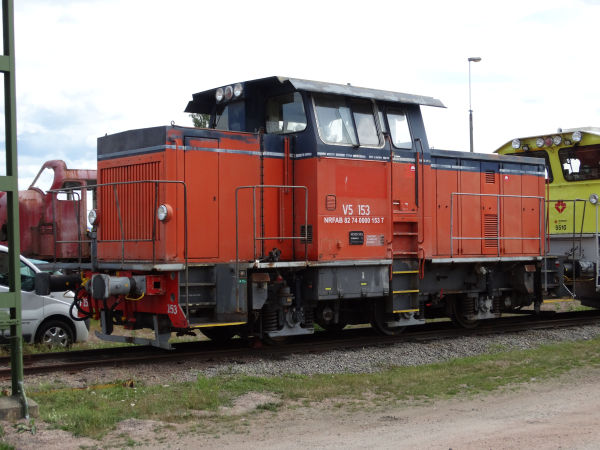
Nordic Refinance is one of the companies that buys used locomotives and leases them back to operators. This is a
class V5 three axle diesel built by Henschel in Germany between 1975-78, bought by NRFAB from SJ.
Picture from the depot area of TÅGAB in Kristinehamn 29.6.2016 by Ilkka Siissalo.
Peterson Rail PRAB
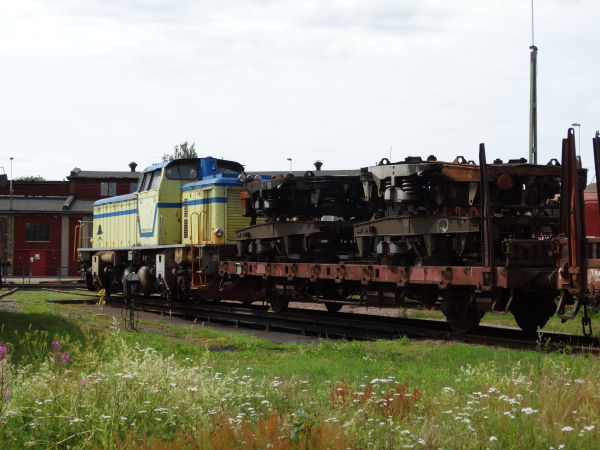
Peterson Rail was a private rail operator with its headquarters in Swedish Trollhättan. Their main business
was timber transport and for that purpose they had in 2012 13 old Danish class MZ (Swedish class TMZ)
Nohab diesels, as well as several leased modern TRAXX electric locomotives and other smaller ones.
Peterson Rail went bankrupt in 2012. This old class T43 diesel still has the owner registration
markings of Peterson Rail. PRAB had in turn bought this from STT which went bankrupt in 2008.
This machine was built by Nohab in 1962. Picture from Kristinehamn 29.6.2016 by Ilkka Siissalo.
Railcare T AB
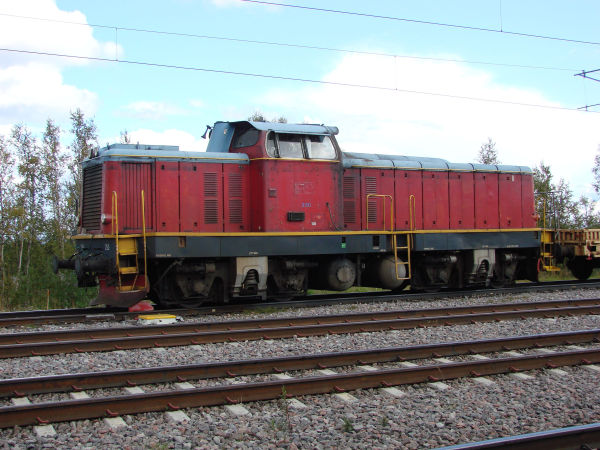
This is an old class T43 diesel, built by Nohab in 1963. It used to be working for SJ, but SJ sold it to
SLV, who sold it to SAB who sold it to Bulkdragarna who sold it to CQC who sold it to NR who sold it to
Bantåg, who sold it 2008 to Railcare T. Here we see it in use for Railcare near the station of Torneträsk
on the Malmbanan route Kiruna-Narvik. Railcare sold it to Three-T sometime in the 2010s. Am I right if I
assume it doesn't make its owners happy anymore? :-)
Picture close to Torneträsk 14.8.2009 by Ilkka Siissalo.
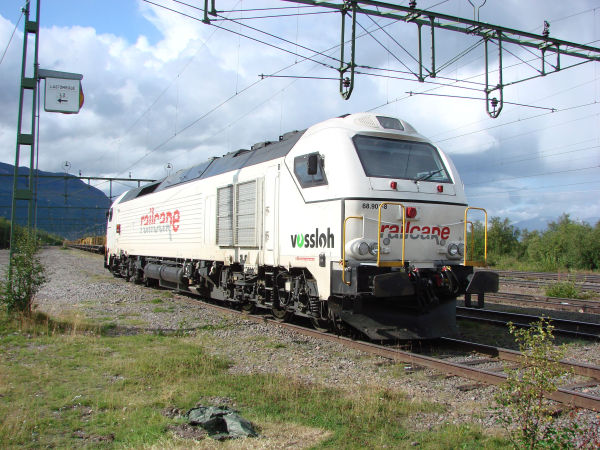
This is a brand new Vossloh Euro 4000, known in Sweden as class T68. Vossloh sent this one, which was one
of the very first Euro 4000 machines (actually serial no. 0004) to the northern parts of Sweden and Norway
to prove that these machines are well suited for the harsh winters in Lapland. The tests went well and
Railcare bought the machine and has been using it at least both in Sweden as well as Norway.
Picture at Abisko station 14.8.2009 by Ilkka Siissalo.
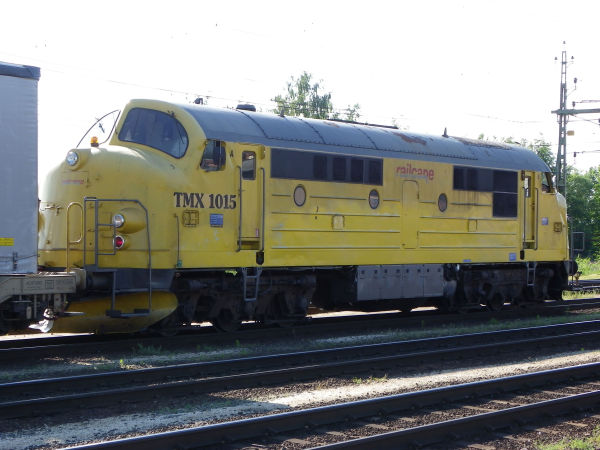
A class TMX, former Danish class MX, Nohab diesel from the 1950s, here used by Railcare.
Photo from Nässjö station 29.6.2010 by Ilkka Siissalo.
Strukton Rail STR
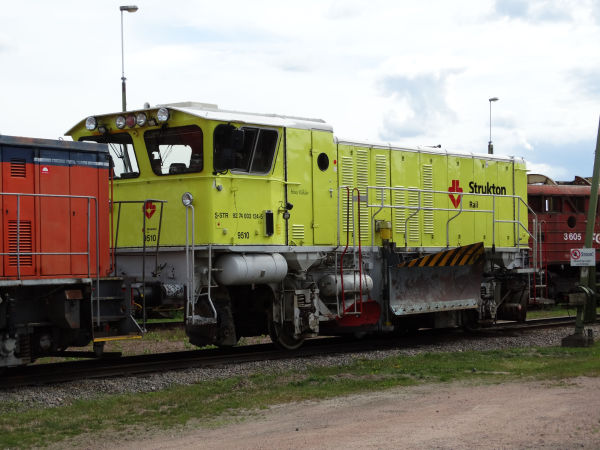
Strukton Rail claims to be Sweden's biggest private railways company. They specialise especially in track
maintenance, but do a lot more too. This is Strukton's diesel locomotive of the class Tc with snow plough
equipment, used wintertime for snow roaming, but during summer especially in track maintenance trains.
Picture in Kristianshamn 29.6.2016 by Ilkka Siissalo.
Svensk Tågkraft STAB
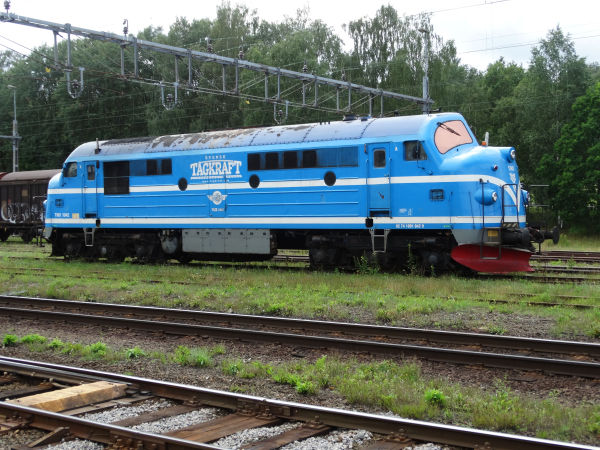
Svensk Tågkraft is a private company, which owns and leases over 20 locomotives of different types,
mostly very old diesels bought from Denmark or Sweden from other operators. Almost all of their engines
are in different colours of their previous owners.
STAB's Nohab diesel of the class TMX (former Danish class MX) is a classic. They were built after the second world war
based on a 1930s US design of General Motors corporation, but adapted to Danish low bridges. The builder was Nohab, which
sold them to the Danish DSB but also to the Norwegian NSB and to Hungary. After the Danish state railways DSB got rid of
them, a large number of them were sold to various operators in Sweden,
Denmark and Germany. Some of these aged machines are even active in Kosovo currently and you can see them on our Kosovo
page.
Picture from Värnamo station 11.7.2016 by Ilkka Siissalo.

Another STAB locomotive; this is a very old ex SJ's class T43. It was built by Nohab in 1962.
Picture at Flemingsberg station 13.7.2016 by Ilkka Siissalo.
Three T, TTT
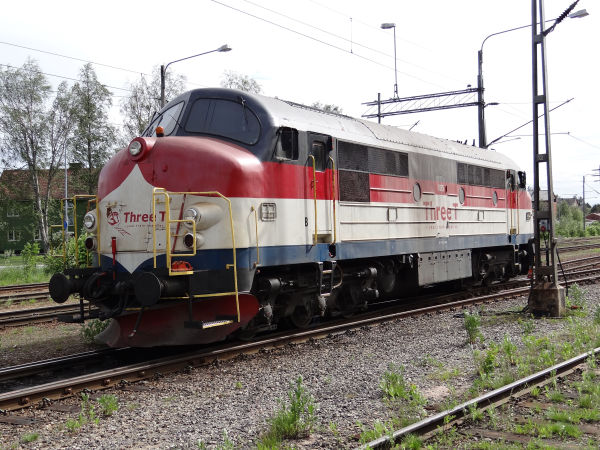
Similarly to Svensk Tågkraft, Three T is also a private company, which owns and leases locomotives of different types.
In 2012 TTT had 12 locomotives, mostly old diesels.
This one is one of the famous round-nosed Nohabs from the 1950s,
but modernised and now even remotely controlled by radio.
Photo by Ilkka Siissalo 13.6.2014 by Holmsund near Umeå.
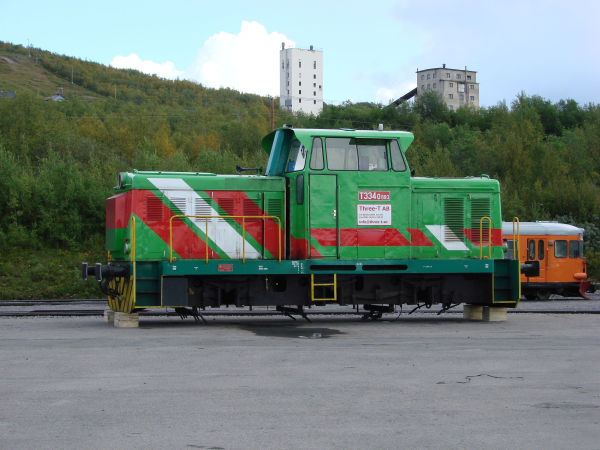
TTT's small diesel T334 in Kiruna deprived of its axles. This is a unique machine, with three axles, built by
Ceskomoravská Kolben-Danék in Czechoslovakia in 1969. 2016 TTT sold the locomotive to Railcare RCT.
Picture 14.8.2009 in Kiruna by Ilkka Siissalo.
Trafikaktiebolaget Grängesberg–Oxelösunds Järnvägar, TGOJ
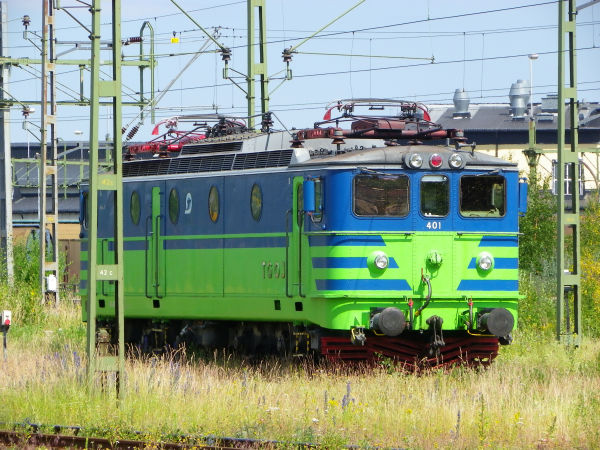
TGOJ is a private railroad company in southern Sweden. Already 1954-58 TGOJ ordered nine locomotives of the same heavy
class Ma which SJ was at that time taking into use. They were used in iron ore traffic between Grängesberg and Oxelosund.
1990 all the remaining Ma locomotives that SJ had were also transferred over to TGOJ, which at the time had become
a daughter company of SJ. The one that we see here has round windows at its sides instead of rectangular ones like in SJ's
Mas. This indicates that this one was one of the TGOJ's original nine Ma locomotives.
Picture in Linköping 29.6.2010 by Ilkka Siissalo.
Transdev
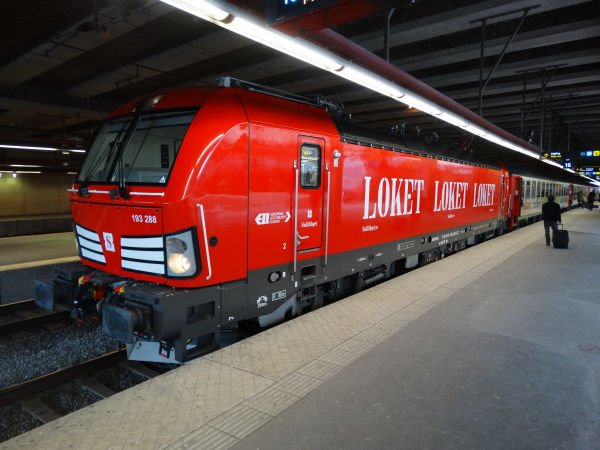
Transdev (former Veolia, still earlier Connex) operates its own express trains in Sweden. For a long time already they
have used as a marketing name the word Snälltåget (express train) which is also printed in large letters at the sides of their
coaches. Earlier these trains were hauled by Hector Rail's locomotives (see on this same page at Hector Rail), but later
Transdev rented locomotives of its own. This machine is owned by ELL, European Locomotive Leasing, and operated by
Transdev on its Snälltåget services. What makes this a bit odd is that this locomotive is in German register as German class
193 (Siemens Vectron) but at the same time the UIC roster on the side of the loco shows that this machine is not allowed to
run in Germany and not in the in-between Denmark either. Kind of funny, isn't it?
Picture from Stockholm C 22.3.2018 by Ilkka Siissalo.
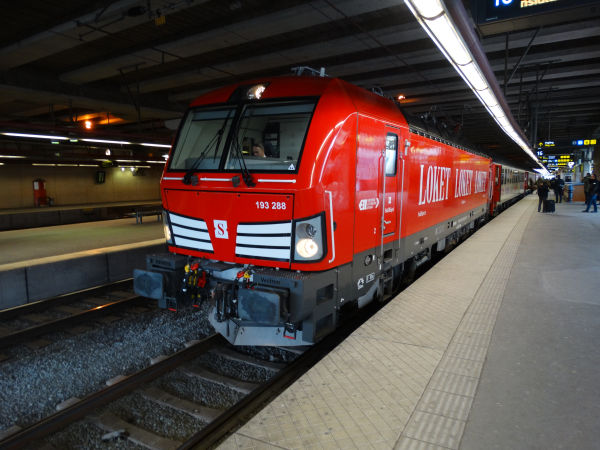
A second view of the same brand new Siemens Vectron, German class 193. In its current state this machine can only run inside
Sweden.
Picture from Stockholm C 22.3.2018 by Ilkka Siissalo.
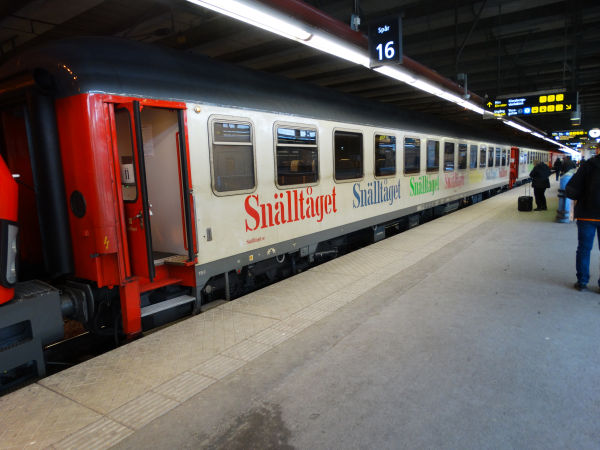
Most of Transdev's Snälltåget's coaches are former German DB InterRegio coaches which became free when DB cancelled all of its
IR services. They have just been renovated inside, but technically they are typical 1960s express trein wagons in the German
style.
Picture from Stockholm C 22.3.2018 by Ilkka Siissalo.
Tågåkeriet i Bergslagen, TÅGAB
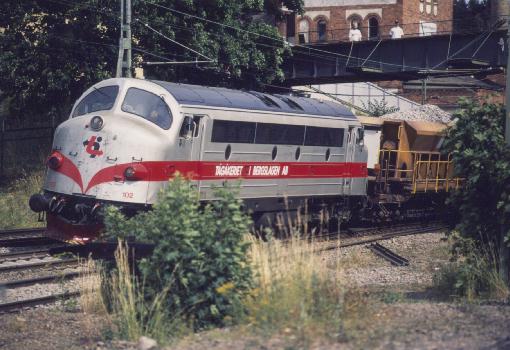
A Nohab diesel of class TMY, ex-DSB class MY, in Gnesta in 1994, now owned by Tågåkeriet i Bergslagen AB, TÅGAB.
Photo by Urban Fredriksson. Uploaded Oct 18, 1995.
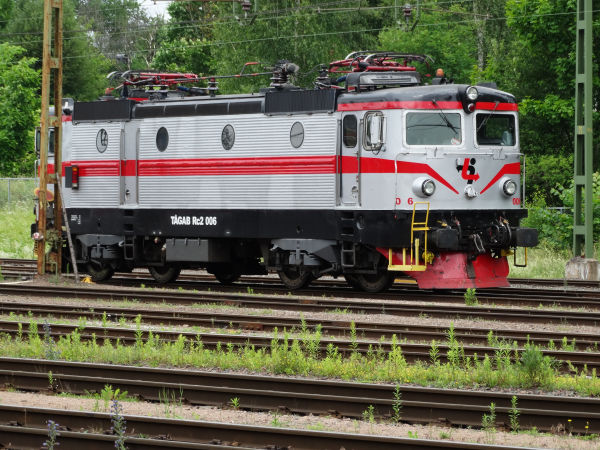
TÅGAB has bought quite a number of old Rc1, Rc2 and Rc3 locomotives from SJ/GC and has also modernised some of them.
This is a TÅGAB Rc2 in Kristinehamn, near the TÅGAB depot. If you compare it with an Rc2 of Green cargo, you can notice
an extra air conditioner box on top of the roof to cool the drivers cab. It also has yellow railings and stairs at the
corners and the driver can remotely radio control the locomotive and stand on the stairs while doing shunting. All these
are similar changes to what Green cargo has done to their Rc2s when they modified them to become Rd2s, but TÅGABs
changes have not been so profound and they still call them Rc2.
Picture in Kristinehamn 30.6.2016 by Ilkka Siissalo.
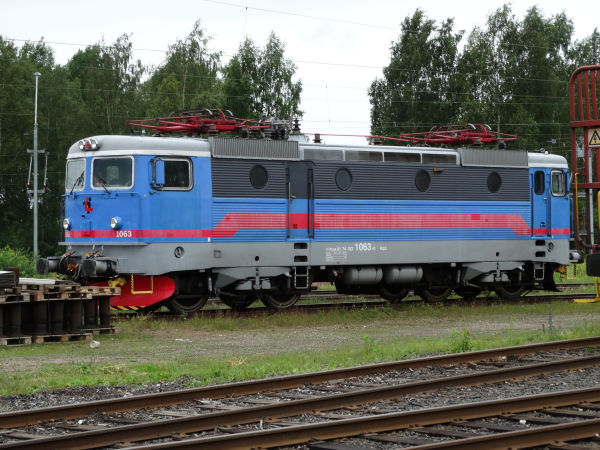
An Rc3 which TÅGAB has bought from Green cargo, still in SJ's paintings.
Picture in Kristinehamn 30.6.2016 by Ilkka Siissalo.
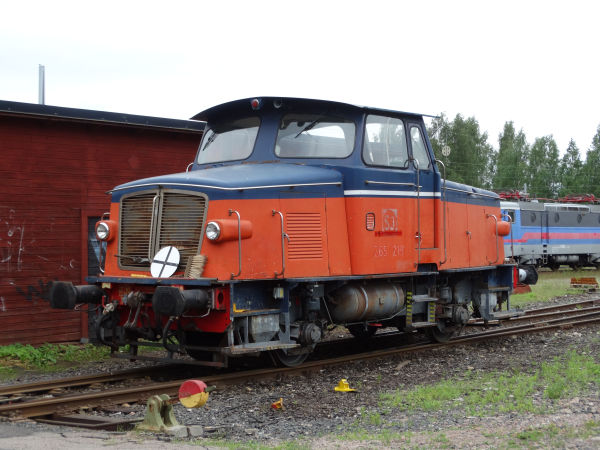
An old Z65 locomotor which TÅGAB has bought, still in the very old SJ orange paintings. TÅGAB owns 6 of these old
locomotors, which were built 1957-67.
Picture in Kristinehamn 30.6.2016 by Ilkka Siissalo.
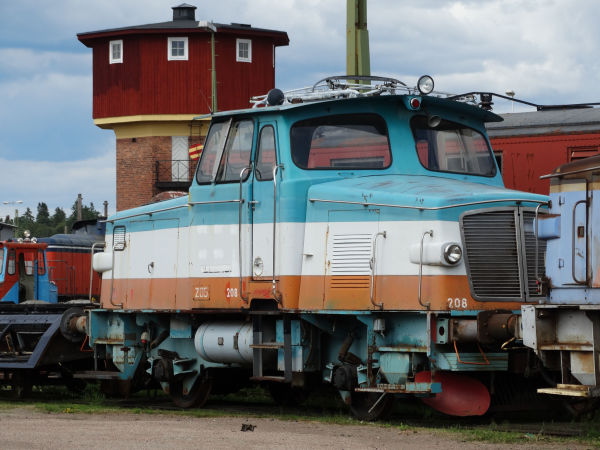
Another one of TÅGAB's Z65 locomotors, but in a different painting.
Picture in Kristinehamn 29.6.2016 by Ilkka Siissalo.
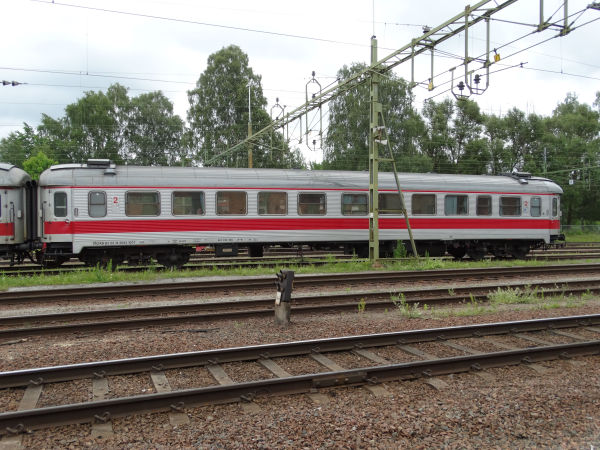
TÅGAB has also bought quite a large number of old express train coaches from Sweden, Norway and Germany and it leases
them to other operators, but TÅGAB also runs its own private express trains.
Picture of an old B1 express train
coach in Kristinehamn 30.6.2016 by Ilkka Siissalo.
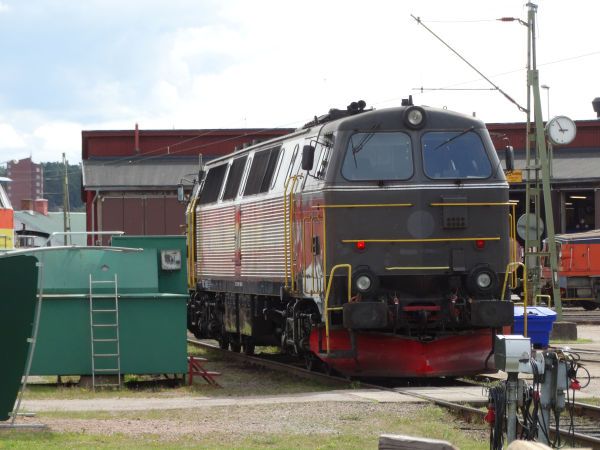
This one is a heavy cargo diesel locomotive of the class TMZ, former Danish DSB class MZ, built by Nohab in Sweden.
DB Cargo Danmark (formed DSB Cargo) still has some of these in use in Denmark, but most have already been sold or
scrapped. They were built in several series between 1967 and 1977.
Picture in Kristinehamn 29.6.2016 by Ilkka Siissalo.
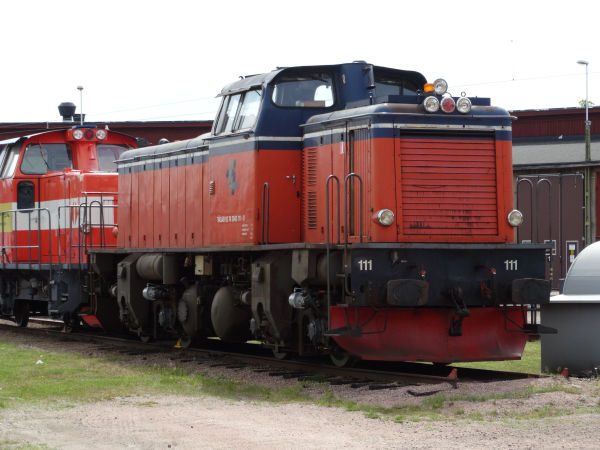
This one is an old SJ class T43 diesel, still in SJ's very old paintings. They were built 1961-63.
Picture in Kristinehamn 29.6.2016 by Ilkka Siissalo.
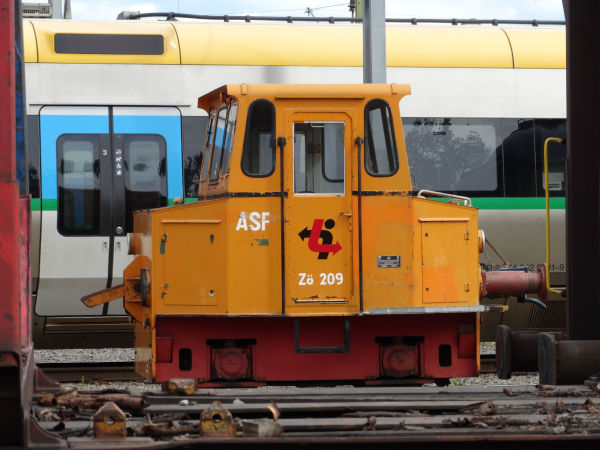
This cute little thing, a locomotor of the class Zö is pure "ostalgy" or DDR-nostalgia. They were produced in East Germany
during the communist times by the "peoples owned company" LEV Hennigsdorf in 1981. According to the books
there is supposed to be only one of these in Sweden. But that is not true. Proof lies below.
Top speed is 6 km/h and the engine power rating is 17kW, just enough to make one wagon move :-)
Picture in Kristinehamn 29.6.2016 by Ilkka Siissalo.
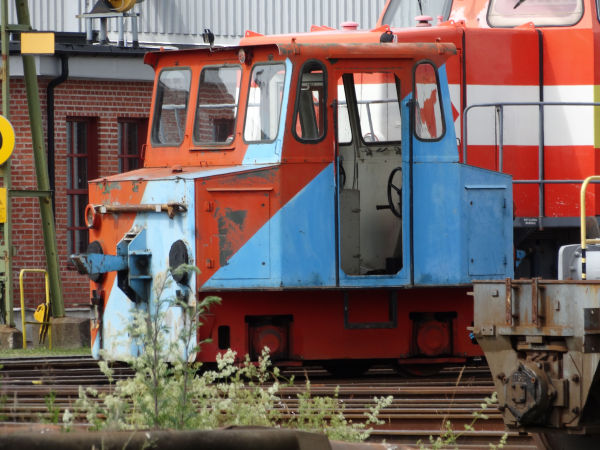
Books (e.g. "Svenska Lok och motorvagnar" by Diehl and Nilsson) claim that there is only one of these DDR built
locomotors of class Zö in Sweden, but now there were two at the same time in the same place. Here is the other one.
Picture in Kristinehamn 29.6.2016 by Ilkka Siissalo.
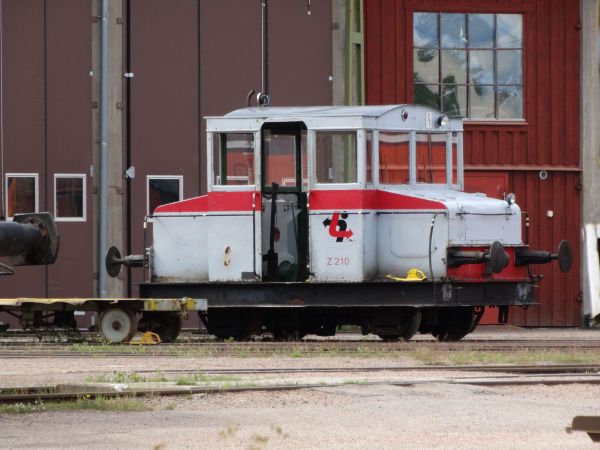
Even older than the previous one, this is a locomotor of the class Z. They were built between 1928 and 1935
and it is still in use !
Picture in Kristinehamn 29.6.2016 by Ilkka Siissalo.
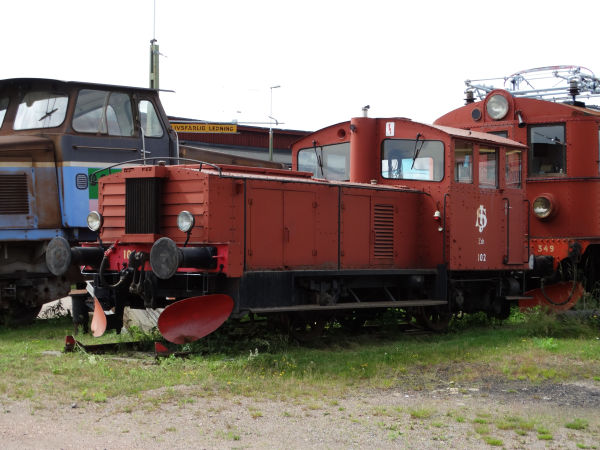
This historic locomotive is SJ's class Zsh (II), built by Kockums in 1939. Its power rating was 110 kW
and top speed was 45 km/h. 15 of them were built in total.
Picture in Kristinehamn 29.6.2016 by Ilkka Siissalo.
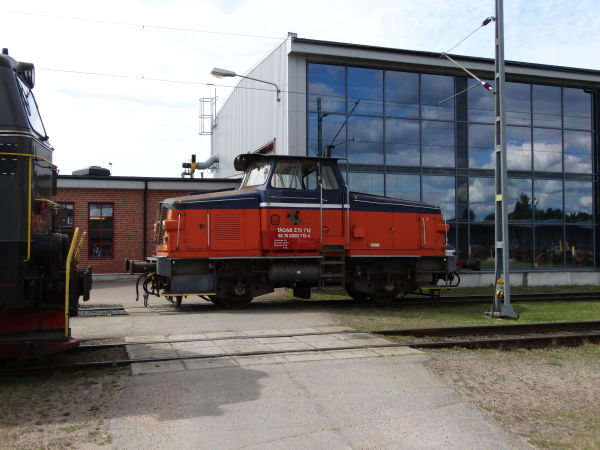
A small locomotive of the class Z70, still in SJ's old colours. Compared with the previous ones, this is modern.
Class Z70 was built between 1990-92. It has a power rating of 333kW and a top speed of 70 km/h. By the way -
when this picture was taken, the machine was moving, but there was nobody inside. It was radio controlled from far away.
Picture in Kristinehamn 29.6.2016 by Ilkka Siissalo.
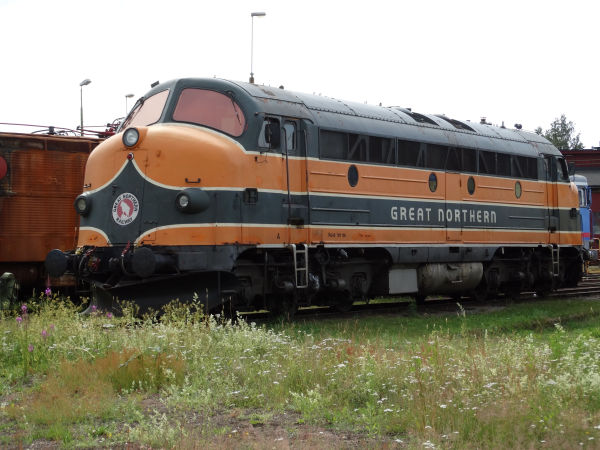
This locomotive is famous ! It is a class TMY, previously Danish DSB class MY, roundnosed Nohab. As these Nohabs were
designed in the early 1950s, the design was based on a 1930s US design of General Motors corporation. This one locomotive
was once used in a film to play as an old US locomotive and therefore it got a painting according to the old painting
scheme of the US train company Great Northern. It has retained this painting and train enthusiasts with their cameras
have been chasing it with their cameras for years wherever it goes. It's probably one of the most photographed locomotives
of Sweden.
Picture in Kristinehamn 29.6.2016 by Ilkka Siissalo.
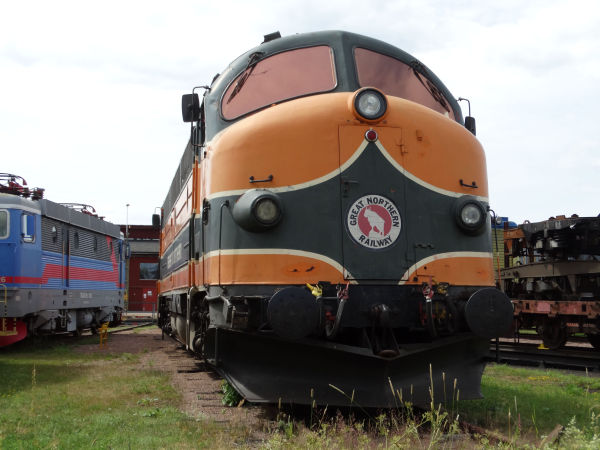
Another view of the famous filmstar Nohab. "Great Northern Railway" - or should it rather be "Fake Northern Railway"? :-)
Anyway, it is a very impressive and huge locomotive.
Picture in Kristinehamn 29.6.2016 by Ilkka Siissalo.
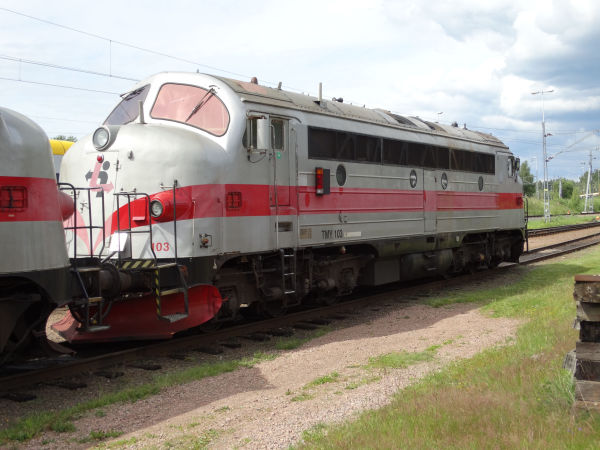
Another Nohab of the class TMY / ex Danish MY. TÅGAB had that day two of these in active use, just waiting for their next train
at the TÅGAB depot. Apparently their last task had been to haul a timber train, two Nohabs at the same time.
Picture in Kristinehamn 29.6.2016 by Ilkka Siissalo.
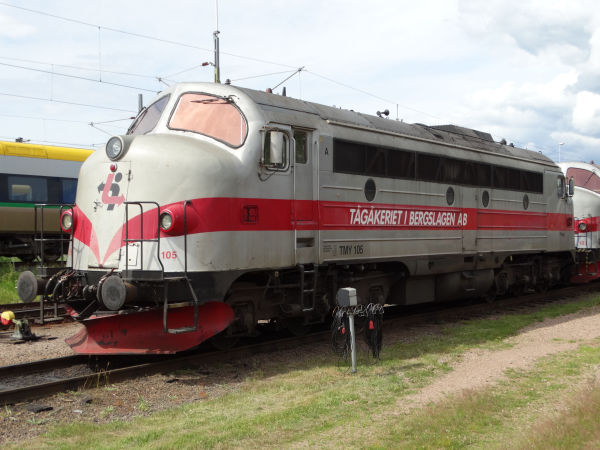
A third TMY Nohab of TÅGAB.
Picture in Kristinehamn 29.6.2016 by Ilkka Siissalo.
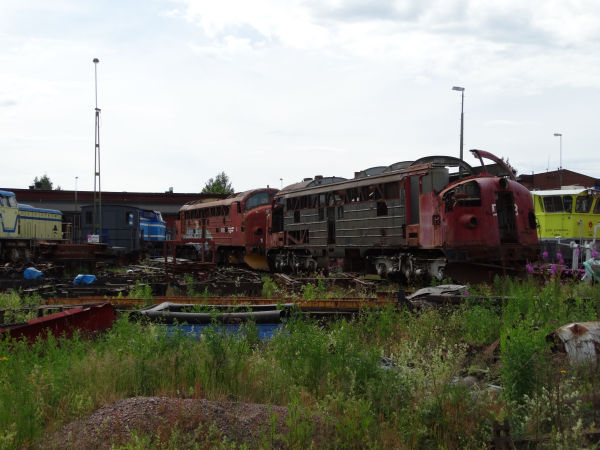
These two Nohabs of the class MY / TMY have seen better times. The first one is in colours of the Danish state railways
DSB and the one behind is in the colours of Norwegan state railways NSB. Now they are in the scrapyard of TÅGAB, where they are
used as sources of spare parts for TÅGAB's Nohabs in active use. Otherwise it's difficult to get parts to a 1950s machine.
Picture in Kristinehamn 29.6.2016 by Ilkka Siissalo.
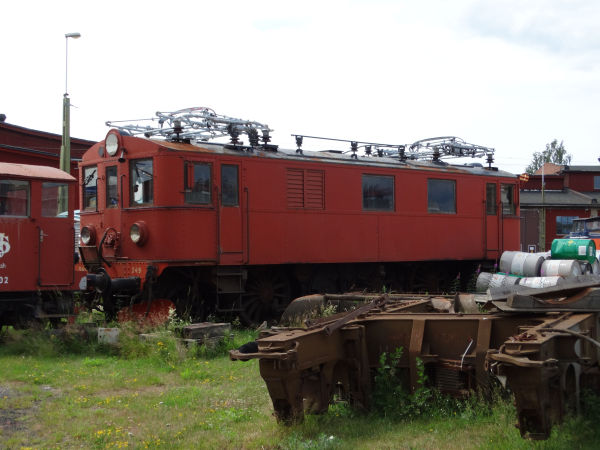
This is something that I would never have expected to find anywhere any more. It is an electric locomotive
of the class D. They were built in 333 copies by Asea between 1925 and 1943. Bergslagernas Järnvägs, a private company and a
precursor of what is today TÅGAB bought some of them in the 1930s. According to books the last class D locomotives were taken
out of service in 1968.
Picture in Kristinehamn 29.6.2016 by Ilkka Siissalo.
Åkers
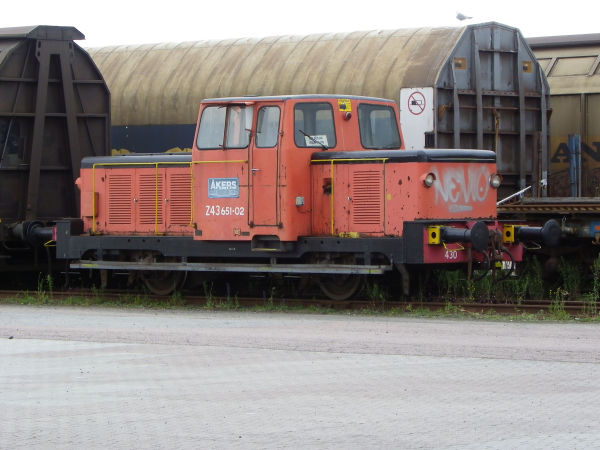
A class Z43 locomotor, previously owned by SJ and now by Åkers Styckebruk, seen here at the Helsingborg harbour
30.6.2010. The Z43s were produced during 1954-1961 and due to the long time, there were many variants. This is
one of the later ones. Compare this one with the very early and beautifully restored Z43 in its original colours,
kept at Nässjö railway museum. That picture
can be found in our archive at Sweden -> Diesel locomotives of SJ and GC.
Photo in Helsingborg 30.6.2010 by Ilkka Siissalo.

